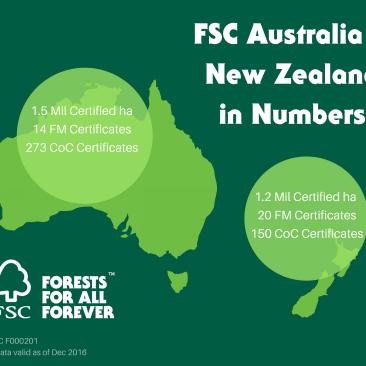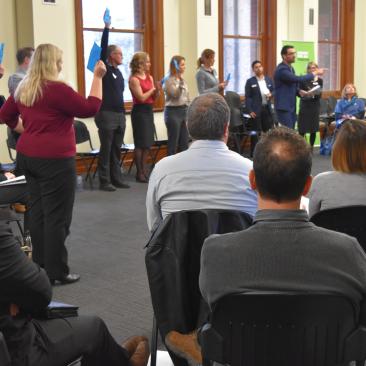Although “Aussies” and “Kiwis” don’t always get along on the sports field, they work very successfully together because they share a similar market and culture within FSC. They have a unique subregional arrangement with a national office in Australia and national representative in New Zealand. FSC Australia and FSC New Zealand share services such as trademark and communications, which is great for their members, certificate holders and retail supporters - especially when they want to launch campaigns at the Australasian level.
The main difference between the two markets is that New Zealand’s commercial forests are all plantations, 70% of which are certified. The preference for plantation over natural forestry production in New Zealand is the result of deliberate social policy that allows most natural forests to be preserved for biodiversity and recreational purposes. In Australia, only 12% of commercial forests (natural and plantation, the former in the vast majority) are certified to FSC’s high standards.
You can find FSC Australia and New Zealand Offices in the capital cities, Melbourne and Auckland respectively. Thankfully, the distance is shortened with their regular catch-up’s using Skype. In a similar tone, their reach has expanded by using online meeting services to communicate with stakeholders. Most of their systems are digital, and as cloud-based offices, provide a lot of flexibility. As a result they have very little equipment and so operate in co-working spaces, where they have the opportunity to work alongside many industries.
With both countries’ National Standards processes well under way, FSC is truly well established in the region. Consumer awareness is on the rise for Australia and New Zealand, with most recent findings at 24% and 20% respectively. Their office and membership base look forward to more business development progress as they strive for FSC to be the trusted brand for ‘Healthy forests supporting healthy communities’ in Australia and New Zealand.
Keep up with FSC Australia by following them on Twitter: @FSCaustralia or visit their website by clicking here.
You can visit FSC NewZealand's website by clicking here.

These offices work together on business development opportunities that span the Tasman District (a local government district in the North of the South Island of New Zealand), and are in a unique position to collaborate with companies in both countries. Two key accounts are stationery supplier, Officeworks, and hardware store, Bunnings. Last year, Bunnings introduced FSC certified Merbau to its in-store range, opening the door for responsibly sourced hardwoods for consumers.
The retailer also recently announced that a third of their timber products are FSC certified. Officeworks has committed to the responsible sourcing of paper, with a new target of increasing sales of office supplies products that are 100% recycled or FSC certified. During 2016 Officeworks partnered with Australian Paper to produce two paper products: the only Australian-manufactured FSC certified papers sourced from local FSC certified forests.

In the policy department, both Australia and New Zealand are currently in the process of developing a National Standard for forest management. FSC Australia’s National Board approved submission of the FSC Australia Forest Stewardship Standard to FSC International in January this year, and the National Office has proceeded with submission accordingly. Submission of the Standard to FSC International represents a significant milestone in the history of FSC Australia and responsible forest management in Australia. After three years of discussions and development, the Standards Development Group were able to achieve consensus on all but three areas relating to workers’ rights, riparian (wetlands adjacent to rivers, streams and lakes) definitions and representative sample areas.
In New Zealand, consultation has just closed on the Draft Revised National Standard. The FSC Standards Development Group (SDG) have chosen to include an indigenous chamber to represent the Maori People, whose culture is very present in the territory. The SDG has been very active in the country representing FSC long before a national representative was established.

